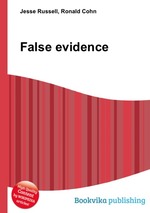False evidence
Jesse Russell Ronald Cohn
бумажная книга
High Quality Content by WIKIPEDIA articles! False evidence, forged evidence or tainted evidence is information created or obtained illegally, to sway the verdict in a court case. Also, misleading by suppressing evidence can be used to sway a verdict; however, in some cases, suppressed evidence is excluded because it was found hidden or locked away in areas the accused could not be proven to know. In Britain, falsifying evidence to convict the guilty is known as `Noble Cause Corruption`. Some evidence is forged because the person doing the forensic work finds it easier to fabricate evidence than to perform the actual work involved. The planting of a gun at a crime scene would be used by the police to justify shooting the victim in self-defense, and avoid possible prosecution for manslaughter. The fact that the police/prosecution, (one of the parties with a vested interest in a trial), effectively controls the supply of most or all of the evidence, is a fundamental problem of the adversarial trial system. However, the accused might have falsified some evidence, especially if not arrested immediately, or by having other access to a crime scene and related areas. Falsified evidence could be created by either the police/prosecution or the defendant(s), or by someone sympathetic to their cause.


